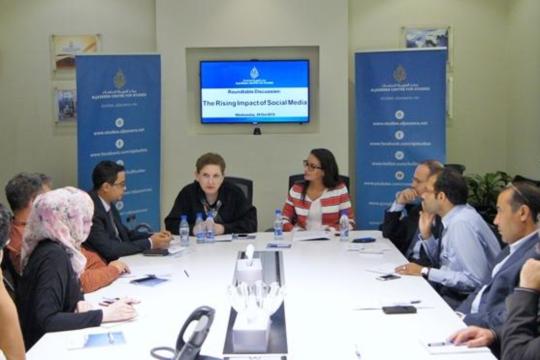
 |
| [AlJazeera] |
Al Jazeera Centre for Studies hosted Magda Abu-Fadil for a roundtable discussion on Wednesday, 28 October 2015, on the rising impact of social media on traditional journalism and how a set of ethics can be developed to balance it out, focusing on Lebanon as a case study in the Arab world, particularly after the neighbouring revolutions.
Abu-Fadil is the director of Media Unlimited, an institution that aims to establish and maintain high standards for professional journalists and organizations or individuals dealing with the media across the MENA region through the training of journalists, media consulting, developing media curricula for schools and universities, media literacy, writing, editing, blogging, and communications/media crisis management training. She is a former foreign correspondent and editor with international news organisations such as Agence France-Presse and United Press International. She also headed the Journalism Training Program at the American University of Beirut, which she founded, and has written for news outlets such as Asharq Al-Awsat, Al Riyadh, and Defense News. In addition, she served as Washington bureau chief of Events magazine, and the Washington correspondent for London-based The Middle East magazine.
In her presentation, Abu Fadil discussed the motivations, doubts, and dilemmas of mainstream media. In addition, she spoke about how media coverage in Lebanon has become heavily local due to its current domestic woes; and how journalistic practices have developed over the years, highlighting that the process of making and consuming news as well as the definitions of journalism and journalist have changed vastly. She also gave emphasis to the nature and importance of social networks for journalism and media outlets.
The roundtable is part of a series of activities by AJCS designed to increase dialogue and enrich its researchers’ background information on current events.